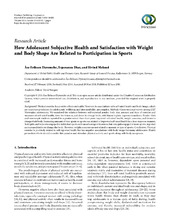How adolescent subjective health and satisfaction with weight and body shape are related to participation in sports.
Peer reviewed, Journal article
Published version

Åpne
Permanent lenke
https://hdl.handle.net/1956/10193Utgivelsesdato
2014Metadata
Vis full innførselSamlinger
Originalversjon
https://doi.org/10.1155/2014/851932Sammendrag
Background. Physical exercise has positive effects on health. However, its associations with self-rated health and body image, which are important predictors for adolescents’ wellbeing and later morbidity, are complex. Methods. Cross-sectional survey among 2527 Norwegian adolescents. We examined the relations between self-reported gender, body size, amount and type of exercise and measures of self-rated health, drive for thinness, and desire to change body, with binary logistic regression analyses. Results. Girls and overweight students reported to a greater extent than their peers impaired self-rated health, weight concerns, and desire to change their body. Increasing amount of time spent on sports was related to improved self-rated health in a dose-response manner. Both girls and boys who engaged in individual sports with an advantage of leanness, but only girls engaged in team sports, reported an increased desire to change the body. However, weight concern was not related to amount or type of sports. Conclusions. Physical exercise is positively related to self-reported health but has negative associations with body image for many adolescents. Health promotion efforts should consider this paradox and stimulate physical activity and sports along with body acceptance.
